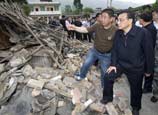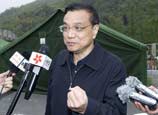
Related Reading:
China hits back with report on U.S. human rights record
Full Text of Human Rights Record of the United States in 2012
BEIJING, April 20 (Xinhua) -- It has almost become an annual ritual in recent years for Washington to wrongly slam China over what it calls "human rights" issues.
The United States on Friday released its Country Reports on Human Rights Practices for 2012, denouncing China's "human rights abuse" and alleging that repression and coercion against rights advocates were "routine" in China.
Since former president Jimmy Carter injected human rights issues more prominently into U.S. foreign policy, anxious politicians along the Potomac River have developed an odd and disturbing habit of judging China's human rights situation from afar.
Their human rights report, now in its 36th year, has been routinely criticizing China -- by an essentially U.S. double standard -- for its "substandard performance" in protecting the political rights of its citizens.
It has so far served well to support Washington's repeated China-bashing for whatever political purposes.
The report itself is flawed as it often cites unconfirmed media reports and speculations as "evidence" to criticize human rights conditions in other countries.
While concentrating mainly on political affairs, it ignores the broader aspect of human rights issues, such as economic and social problems ranging from poverty, income gap, crimes, gun control to racial discrimination, which are anathema to the United States.
It also overlooks the diversity of human civilization and varying levels of countries' development that call for different priorities in improving human rights conditions.
On human rights issues, the U.S. is almost the pot calling the kettle black. Its brazen violation of international human rights norms and treaties in the wars outside its boundary has called into question its own credibility and moral integrity to judge other countries.
Rather than interfering in the internal affairs of other countries, Washington had better spend more time putting its own house in order.
On top of that, the United States should rein in its dangerous instinct to police the world based on its own rules and wishes. The Chinese people will and can judge for themselves whether or how their human rights situation need to improve.
Talking tough on human rights issues, a quite old item on the China-U.S. fault line, could bring new uncertainties to their bilateral ties and cooperation on core issues such as security and prosperity.
It is understandable that Western nations, including the United States, want to defend the rights they hold dear. But every country needs to be careful not to impose its own will on others and avoid exploiting them to extort political or economic advantages.
It is time leaders in Washington take positive steps to put an end to verbal attacks over human rights issues.
To promote "the universal rights of all persons," as the report claimed, the United States should engage in global cooperation and initiate dialogues on the basis of mutual respect and equality.
















 Baby born right after earthquake in SW China
Baby born right after earthquake in SW China


![]()
